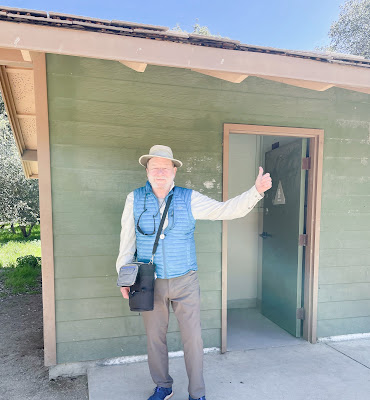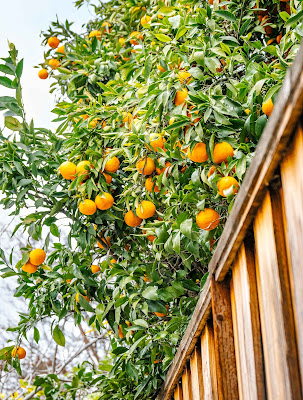 |
| Here I am endorsing CA's restrooms |
I love NH and always will. But, I have to admit, living in the Bay area of California this winter opened my eyes to a few things.
I can't believe how many parks and playgrounds exist out here, all immaculately maintained and beautifully landscaped with native flowering shrubs and flowers. Best of all, most have not a single restroom but several spaced around the spacious grounds.
That's in stark contrast to NH, which has slim-to-none such facilities. I find that surprising since NH has the second oldest population in the nation. And I can attest that the older you get, the less the bladder holds, and the more essential restrooms become.
It's a personal issue for me since I regularly drive to Concord, and the state-maintained rest stop in Epsom was a handy pitstop for me on my trip. It had a few picnic tables, a nice view of the watershed from Northwood Lake, and was staffed by a kind volunteer who kept the bathroom clean and neat.
To everyone's surprise, the State closed the facility about ten years ago. We thought it would soon reopen but never did. It just set there forlornly deteriorating, the lawns unmowed with weeds growing up through the asphalt cracks in the parking lot.
According to the Department of Transportation's (DOT)official correspondence, this 8 acres parcel of land was brought with funds from the Federal Beautification Act of 1965. Nevertheless, Governor Sununu and the Executive Council issued its death sentence in 2012, claiming it was "surplus" to the needs of the Department.
Last year a "For Sale" sign went up, and recently it was sold: We lost a refuge where any traveler could stop for a breath of fresh air, have a picnic lunch, or heed the call of nature.
That's the official story: this property the State acquired for nothing was sold, allegedly because it was unneeded. The real reason, I suspect, is because the State needed cash because of a long-standing Republican refusal to pass a broad-based tax, relying instead on regressive local ones.
The only thing in NH as squared away as California's rest areas, is our state-run liquor stores: splendid structures springing up everywhere like mushrooms after a rain. It's easy to see what NH deems important.
But not having restrooms in NH is only a nagging inconvenience: What really irks me is our response to climate change, the biggest existential crisis of our times. California has always been a leader, and the results are self-evident: Around San Jose, it seems like one-in-three cars are now electric. And solar panels are popping up everywhere like white frost appears after a hard frost.
NH's response has been the opposite, negative from the beginning, in no small part because of the Sununu clan. Back in the 1980s, Republicans were as eager to address climate change as Democrats; that is, until our former Governor, John Sununu, in his role as Chief of Staff to President George Herbert Bush, poisoned the waters.
With such bipartisan support, we could have resolved the climate crisis, nipping it in the bud back in 1989, if we had ratified the global treaty proposed at the first international climate conference, according to Nathaniel Rich in Losing Earth: The Decade We Almost Stopped Climate Change1. He writes the blame for this colossal missed opportunity rests primarily with John Sununu, who was adament that the climate crisis was “poppycock.”
Here’s how the Concord Monitor summarized Rich’s report: “Sununu, whose son Chris currently serves as governor and whose son Michael is one of the state’s more vocal climate change skeptics, emerges as the villain of the piece, the man who almost single-handedly thwarted the first major international effort to limit carbon dioxide emissions.”2
Rich provides solid evidence that John Sununu was the instigator of a coordinated effort to bewilder the public on the topic of climate change, “changing it from an urgent, nonpartisan and unimpeachable issue to a political one.”3
Unfortunately, that effort continues today as our Governor, like his father, continues to bamboozle the public. Chris’s favorite trick is to copy Mohammad Ali’s tactic of buying time by tying his opponents up on the ropes.
Sometimes, we don’t know how bad things are until we get a new perspective from living in another state. I will close by quoting Matthew Stein who recently moved back to NH from California, as reported in the NH Bulletin.
“We didn’t realize it at the time, but when my family and I moved from California to New Hampshire in 2021, we also traveled back to the Stone Age on climate policy. Amongst its New England neighbors, the Granite State has the worst record on climate resilience, is the only state absent in the U.S. Climate Alliance, and is the only state with no functioning climate action plan (CAP).4”
For the sake of us all of us in the Granite State, maybe it’s time for the Sununu Dynasty to come to an end.
xxx
1 https://www.nytimes.com/interactive/2018/08/01/magazine/climate-change-losing-earth.html
2 https://www.concordmonitor.com/Sununu-and-climate-change-19676534
3 https://en.wikipedia.org/wiki/John_H._Sununu



















